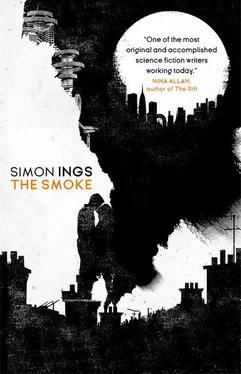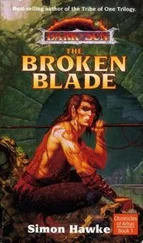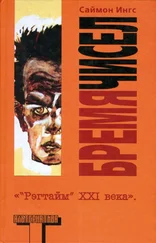‘The point of space,’ said Jim, ‘is being there. Don’t you agree? No, you don’t,’ he continued, not letting Georgy respond. ‘You’d rather send up machines. Each to his own, but I want to see the Earth spread below me with my own eyes.’
Georgy cocked his head: a predator sizing up prey. ‘What a pity you only have one pair.’
Stella shot me a look. She didn’t like the combative turn the conversation was taking. But what was I supposed to do? Get the two sides of this dinner to meekly agree on their mutual incomprehension? I said: ‘I suppose, having given birth to the dead in Catford, it’s a relatively small step to give birth to them on the Moon.’
Georgy’s smile tightened.
‘That is the idea, isn’t it?’
‘It’s certainly a possibility,’ he conceded.
‘Already you’re populating other planets!’
He did not look at me. ‘Quite why everyone is so fascinated by the population curves of the Jewish race, I’ll never know. It has always been like this. As if we’re a sort of human isotope. Don’t let them reach critical mass!’
His angry defensiveness astounded me. Why now, here, among friends, was Georgy referring to his community by the old, unhappy name? The whole point of the Bund had been to repudiate its tribal past. Of all the bizarre figures forged in the inferno of the Great War, the Bundist – thoroughly modern, rigidly materialist, crushing the rabbi under his proletarian heel – had surely been the most compelling, the most exhilarating.
‘If it was critical mass we were afraid of,’ I said, ‘I think we’d look at London and declare that battle lost for good and all.’
By Georgy’s expression, I could see that he still thought I was attacking him. Fel had let go of my hand. Perhaps she thought so, too. I did not care. My blood was up. I knew what he thought I was. All I could do was answer fire with fire. ‘When you’ve finished snatching racial failure from the jaws of political victory,’ I said, ‘you might just possibly see that I was paying you a compliment. Whatever the Space Force accomplishes – men in space, men on the Moon, men on Mars – it’s obvious to me that you will still be first to settle these places. That is, I assume, what your machines are for? To build for your arrival?’
‘First to settle?’ This from Bob, for whom none of my oh-so-important opinions had made any sense at all. ‘Well, I don’t know about that. I think Jim and his mates might surprise you there, Mr Chernoy.’
Chernoy did not miss a beat. ‘How very proud you must be of your son,’ he said, reaching across the table.
Bob, blinking, rose as if hypnotised to shake Georgy’s hand.
I glanced at my watch. ‘Stella?’
Stella and I served the food while Jim, in the lull occasioned by my absence – what on earth had I been thinking? – held forth about his training. Bob, at least a little tight and with a second bottle of beer on the go, listened intently. Georgy had relaxed at last, though as usual his open, warm smile gave absolutely nothing away. I couldn’t catch Fel’s eye to see what she thought of my altercation with her father. It hadn’t been my finest hour, but of one thing I was sure: he had started it.
‘I don’t know how we’re going to fill the days of our voyage, exactly,’ Jim admitted. ‘There won’t be much to master about the ship itself: it’s the size of a frigate, as you say, and a damn-sight easier to sail.’
‘And where will you go?’ Georgy asked. ‘All being well.’
More rearrangements of the glassware: ‘So you see, even Jupiter is not outside our range.’
Georgy looked impressed. ‘And do you have special suits prepared for Mars?’
Jim blinked, blindsided by a question so specific and so very much off the point. ‘I’d be the last to know about details like that,’ he said again.
‘Only I’ve heard it said that it’s going to be easier to run on the Martian surface than it is to walk,’ Georgy said. ‘So I suppose the designers are going to have to think about that.’
You could see Jim taking confidence from the question. You could see him thinking: Here we are, two men together, thrashing out the technical detail. ‘True enough,’ he said. ‘Your power-to-weight ratio is different in lower gravity – more like a child’s. The smaller you are, the stronger you are relative to your size. And that’s why little kids are always running about from place to place. It’s easier for them to run than walk.’
I remembered the strange combination of awkward slowness and pell-mell speed exhibited by Chernoy’s Processed infants: old souls in bodies adapted to a more accommodating physics.
Before I could put any of that into words, however, Georgy once again launched himself into wild territory. ‘A lot of little kids running about on the Red Planet!’ he cried.
Everybody looked at him.
He blinked at us. ‘Well, isn’t that what it’ll be like? It’s charming. The thought of James here skipping about Schiaparelli like a toddler.’
Silence.
‘Oh, come on , why go all the way to Mars if you’re not going to have a bit of fun?’
It occurred to me that it was we who were being thin-skinned now. Grown men playing tag in the red dirt? The vision was charming! Especially so in the eyes of a man who had fused the infantile and the aged into one constantly renewing – and therefore immortal – form.
‘Fel,’ said Georgy, serious suddenly. ‘What is that you’re drinking?’
Fel reflexively wrapped her hand around her bottle. ‘It’s beer,’ she told him. I had never really taken any notice of her interest in alcohol, which anyway never exceeded the odd half of cider down the pub. Hearing the tremor in her voice now made me realise that breaking with the Bund’s teetotal tradition was a big deal.
‘Really?’
‘Really.’
‘Well.’ Even Georgy’s control slipped occasionally: he shot a glance at me. A corrupter of women as well as an anti-Semite.
‘Has everyone got enough?’ Stella asked. ‘Oh, God. The beans.’ She ran back to the kitchen.
‘They’re on the side,’ I called, and when she didn’t respond, went into the kitchen after her. Stella was peeling the foil off the pan. ‘Oh, look, they’re burned!’
‘They’re not burned.’
‘The garlic’s all brown.’
‘Not very brown. It’s supposed to be toasted, it’s fine.’
‘You can’t do that with garlic.’
‘Yes you can. With this, you can. Stella, look at me. What do you think I cook for Fel? I cook this kind of food all the time. It’s perfect.’
Stella mouthed a thank you and carried the dish out to the dining room. I fetched a spoon.
The beans were perfectly fine. Trust Bob, though, to be meticulously cutting off each tip and edging it with his knife to the side of his plate. Had Stella noticed? No: her gaze was glued to Georgy Chernoy who, having got everyone’s attention with his potentially belittling remark about playtime on Mars, was holding forth on his favourite subject: the reconciliation of what, in a more formal setting, he would probably have dubbed ‘the human family’.
‘It’s absurd!’ he exclaimed, and Jim chimed in, banging the zinc with his beer bottle. (Stella winced.)
‘We’re not afraid of you!’ Jim asserted, slurring slightly.
‘Well, of course you aren’t!’ Georgy laughingly agreed. ‘Where could the conflict possibly lie? The moment you’re in space is surely the moment you realise how absurd all this scaremongering is. Do you know, I read an op-ed in one of your papers the other day that raised the spectre of us dropping Moon-rocks on London? That’s the word they used: “dropping”! As if the Moon were above the Earth! It’s positively medieval. Ptolemaic, even.’
Читать дальше












